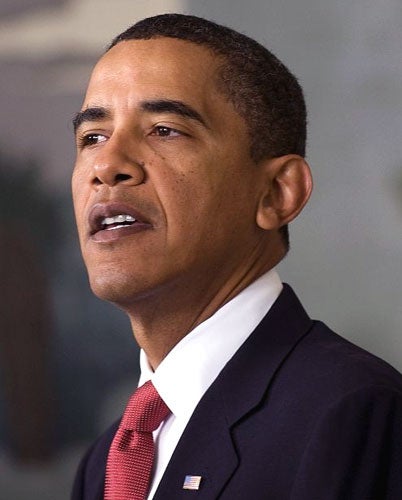Obama shoots down 'son of Stars Wars' missile shield
Bush's baby abandoned in bid to appease Russia Ships in the Med to offer protection from Iranian aggression

Drawing a thorn from relations with Moscow, US President Barack Obama yesterday confirmed that he has abandoned a controversial plan developed by the Bush administration to locate a costly missile defence shield in Poland and the Czech Republic that was meant to protect against possible aggression by Iran.
The announcement came days before two important gatherings of heads of government next week in New York and in Pittsburgh. The US hopes that by shelving the shield project, it will have a greater chance of persuading Russia to participate more fully in pressuring Iran to end its uranium enrichment programme and forswear any plans to develop nuclear weapons.
Anticipating criticism from the right on Capitol Hill, Mr Obama was at pains to insist that the Pentagon had found other and cheaper ways to provide protection to the European allies from Iran. Separately, Robert Gates, the Defence Secretary, said that as a first step, the US will deploy interceptor missiles on Aegis ships to be deployed in the Mediterranean and the North Sea.
"Our new missile defence architecture in Europe will provide stronger, smarter and swifter defences of American forces and America's allies," Mr Obama said from the White House. "It is more comprehensive than the previous programme; it deploys capabilities that are proven and cost-effective."
Aside from helping him fulfill his promise to "reset" relations with Russia, Mr Obama may also have been swayed by intelligence suggesting that Iran is not as advanced in developing the long-range missiles that the shield was meant to address than had been previously imagined. The revised plan will initially be designed to protect instead against short- and medium-range missiles from Iran which are now perceived to be the greater threat.
President Obama telephoned the leaders of Poland and the Czech Republic early yesterday to inform them of his decision. "Just after midnight I was informed," said Jan Fischer, the Czech Prime Minister.
Components of the scaled-down shield may yet be built in Poland and the Czech Republic, which had agreed to host the original system at some political cost. In his press conference, Mr Gates indicated that both countries would be expected to participate in a second stage of the modified plan, which might mean interceptor missiles based on land in eastern Europe. But the second stage would not start until 2015. Moscow had long voiced its grave disapproval of the Bush shield project, which would have brought American military hardware close to its own borders. Indeed, the Russians had complained that its own defences could have been targeted by the system. Mr Obama took a moment to remind Moscow this had never been part of the missile plan. "Concerns about our previous missile defense programs were entirely unfounded," he said.
In spite of the reassurances from Mr Gates, the decision attracted harsh criticism from Republicans. "Given the serious and growing threats posed by Iran's missile and nuclear programmes, now is the time when we should look to strengthen our defences, and those of our allies," Senator John McCain said. "I believe the decision... is seriously misguided."
Calling the shift, "dangerous and shortsighted", another senior Republican senator, Jon Kyl, added: "The message the administration sends today is clear: The United States will not stand behind its friends, and views 'resetting' relations with Russia more important," said the senator. "This is wrong."
The Russian President, Dmitry Medvedev, called Mr Obama's decision a "responsible approach". "I am ready to continue the dialogue," he said in a nationally televised address. But this month, his Foreign Minister said any US decision would be an overdue correction of faulty policy and would not attract any particular favours from Moscow. The refusal by Iran to end its enrichment activities will be high on the agendas of both the UN General Assembly in New York and of the Group of 20 Summit in Pittsburgh next week. The US will be seeking commitments for a new round of harsh sanctions on Iran if it fails to make concessions on the nuclear dossier soon, but Russia, and to some extent China, have been historically wary about punishing Iran too bluntly.
Join our commenting forum
Join thought-provoking conversations, follow other Independent readers and see their replies
Comments